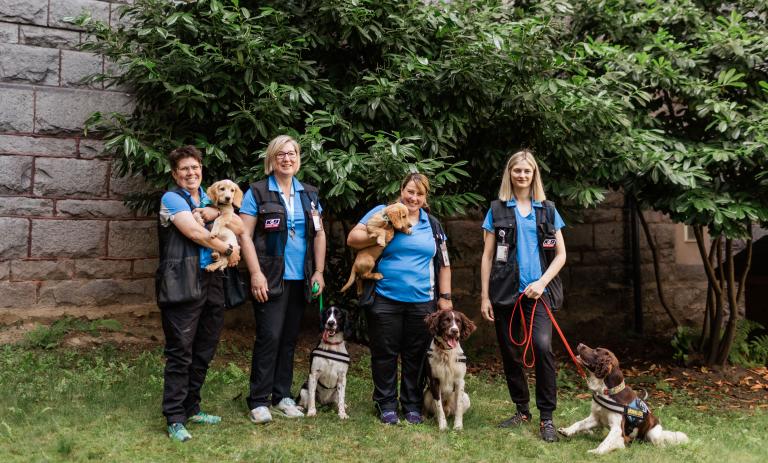Canines 4 Care
Related topics: Health professionals

Led by a multi-disciplinary team of medical professionals, canine detection specialists, environmental service and infection prevention and control practitioners, Vancouver Coastal Health's (VCH) Canines 4 Care (Canines for Care) team rapidly and non-invasively detects pathogens and reduces infection rates in health-care settings.
About
Vancouver Coastal Health (VCH) was the first health-care organization in the world to operationalize its Clostridioides difficile (C. difficile) detecting canine program to detect and reduce cases of C. difficile in the health-care environment. The program is designed to reduce C. difficile infection through a combination of efforts to enhance surveillance, increase staff engagement, improve practices and reduce environmental contamination.
Since 2016, the canine scent detection teams at VCH have searched thousands of hospital areas for C. difficile. They've also visited more than 30 Canadian health-care facilities to share their expertise. The Canines 4 Care scent detection program continues to evolve. Building on the strong foundation developed with the C. difficile scent detection program, VCH is now exploring canine scent detection for new and emerging pathogens including COVID-19.
"[Canine scent detection] is an innovative and exciting way to discover new places where C. difficile might reside. That way we can immediately target problem areas for cleaning and disinfection." - Rita, Infection Control Practitioner

What is C. difficile?
Clostridium difficile (C. difficile) is the most common cause of acute diarrhea in hospitals and long-term care facilities in North America. Over 60% of of C. difficile cases are acquired within health-care facilities - reducing environmental contamination plays a key role in preventing the spread of infection to immunocompromised patients and health-care workers.
Services and support across B.C. and Canada
If you work with a hospital located in British Columbia or across Canada, the VCH Canines 4 Care program also offers various scent detection services to health professionals across the country. See an outline of services our professional canine detection team offers below.
To inquire about the Canines 4 Care program, email us at canines4care@vch.ca.
- Identify C. difficile environmental reservoirs
- Eliminate further contamination and transmission
- Foster an ideal environment to partner with key site and unit stakeholders
- Educate staff in-the-moment upon alert
- Track patterns and trends
- Educate patients and visitors on C. difficile
More articles
-
-
How this B.C. hospital uses dogs to sniff out disease 1 year agoNewsPauseMute Volume levelShareToggle fullscreen Ad 1 of 1: (0:14) Playback will start after this advertisement How this B.C. hospital uses dogs to sniff out disease
CBC News - 2024
-
Canines for Care gets two new adorable members
Global News - 2023
-
-
-
Meet Kip Kip Kaboom and Super Agent Disco, 2 puppies tasked with sniffing out a superbug in Vancouver hospitals
CTV News - 2023
-
Dogs trained to detect potentially deadly superbug at B.C. hospitals
Global News - 2023
-
Meet Angus, the C. difficile-sniffing dog trained to detect superbugs
CBC News - 2016
-
Superbug-sniffing spaniel kept busy at Vancouver hospital
CBC News - 2017
-
Angus the C. difficile sniffing dog fully trained to recognize dangerous superbug
Global News - 2016
-
C. difficile-sniffing dog 'Angus' is ready for his hospital job
CTV News - 2016
-
Man's best friend, bacteria's worst enemy: dog sniffs out superbug in Canadian hospital
The Guardian
-
Frequently asked questions
-
What kind of dog can detect C. difficile?
While all working breeds have proven themselves to be able to do detection, there are some traits in dogs that lend themselves better to this type of detection service in a health care environment:
- Floppy-eared dogs instead of pointy-eared dogs, as they are less intimidating to staff, patients, and visitors.
- Medium size dogs so they can fit into tight spaces, such as in between medical equipment and patient beds.
- Dogs with exceptionally high drive and impeccable temperaments who have been professionally evaluated in a hospital environment
- Animals that are in good health
- Dogs that have not been trained to detect other types of odours
-
Can dogs contract C. difficile or COVID-19?
Similar to humans, dogs are more susceptible to contracting C. difficile from the environment if they are immunocompromised. Our dogs receive regular veterinary check-ups, and are only work in the health-care environment it they receive a clean bill of health.
-
Can a dog differentiate between non-toxigenic and toxigenic strains of C. difficile?
The dogs do not differentiate between strains of C. difficile. Any C.difficile in the environment is undesirable.









